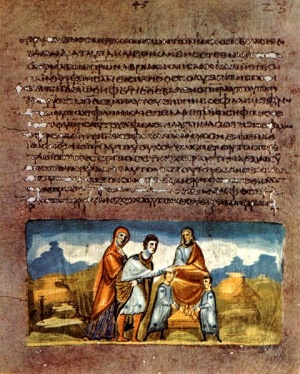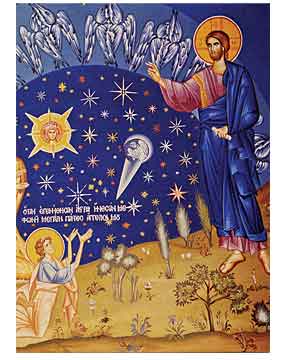Genesis
| This article forms part of the series on the The Old Testament - Septuagint | |
| or simply "LXX", the Koine Greek version of the Hebrew Bible. | |
| Pentateuch or "the Law" | |
| 1.Genesis | 2.Exodus | 3.Leviticus | 4.Numbers | 5.Deuteronomy | |
| Historical Books | |
| 6.Joshua | 7.Judges | 8.Ruth 9.I Kingdoms | 10.II Kingdoms | 11.III Kingdoms | 12.IV Kingdoms | |
| Books of Wisdom | |
| 24.Book of Psalms | 25.Job | 26.Proverbs 27.Ecclesiastes | 28.Song of Solomon 29.Wisdom of Solomon | 30.Wisdom of Sirach | |
| The Prophets | |
| The Minor Prophets, or "The Twelve" 31.Hosea | 32.Amos | 33.Micah | 34.Joel | 35.Obadiah | 36.Jonah | |
| The Major Prophets 43.Isaiah | 44.Jeremiah | 45.Baruch | 46.Lamentations | |
| Appendix | |
| IV Maccabees | |
The Book of Genesis, also known as the First Book of Moses, is the first book of the Old Testament and contains extremely old oral and written traditions of the people of Israel. The English title, Genesis, comes from the Greek translation (Septuagint, LXX)[1] meaning "origins"; whereas, the Hebrew title is derived from the opening sentence of the book, translated "in the beginning". Tradition has it that this book was mostly written by the Prophet Moses[2] 1,300 years before Christ. The influence of Genesis over all of Holy Scripture is demonstrated by it being quoted over 35 times in the New Testament and hundreds of allusions appearing in both Testaments. The story line of salvation begins in Genesis 3 and is not completed until Revelation 21 and 22, where the eternal kingdom of redeemed believers is illustrated.
Contents
Authorship and writing
The author does not identify himself in Genesis. However, both the Old Testament [3] and the New Testament [4] ascribe this composition to Moses [5] even though the context of the story ends almost three centuries before Moses is even born. No compelling reasons have ever come forth to challenge this authorship.
Genesis was written after the Exodus (ca. 1445 B.C.) of the Israelite people, but before the death of Moses (ca. 1405 B.C.).
Major Theme
This is the book of "beginnings". It is widely accepted [6], that it contains the early history of man and of Israel, theological themes revealed to man by God Himself.
The origins of humanity start with the story of creation of the world, the fall of Adam and Eve and the subsequent history of their descendants. It tells of Noah and the great flood, the tower of Babel, and Abram and Melchizedek and the early history of Israel, starting with the three patriarchs of the Hebrews, Abraham, Isaac, and Jacob, and the twelve tribes that were their descendants.
The main theme throughout all of this history is that God's call and promise of salvation for Israel.
Background
The Book of Genesis covers the longest time span of any book in the Bible. It starts with the creation of the world and concludes as the Hebrews head to Egypt. Genesis is not treated as mere history, but as a source of spiritual wisdom and a book inspired by God himself. The first three chapters of Genesis are reflected in the last three chapters of Revelation, the Alpha and Omega of writings "given by inspiration of God." (2 Tim 3:16). Out of all historical information available to Moses, he selected only what was related to the religious life of people. It most likely has been edited for this goal over time.
Outline
- Main Article: Genesis (Outline)
By Content
By content this book is comprised of two sections; the first records four major events in the Early History of Man and the second four great men in the Early History of Israel:
- History of man (Gen. 1–11) and
- Creation (Gen. 1, 2);
- the Fall (Gen. 3–5);
- the Flood (Gen. 6–9); and
- the Dispersion (Gen. 10, 11).
- Patriarchal history (Gen. 12–50)
Literary structure
The literary structure is built around the recurring phrase "the history/genealogy of" and is the basis for the outline
- The Creation of Heaven and Earth (1:1–2:3)
- The Generations of the Heavens and the Earth (2:4–4:26)
- The Generations of Adam (5:1–6:8)
- The Generations of Noah (6:9–9:29)
- The Generations of Shem: Genealogy of Shem to Terah (11:10–26)
- The Generations of Terah (11:27–25:11)
- The Generations of Ishmael (25:12–18)
- The Generations of Esau (36:1–37:1)
- The Generations of Jacob (37:2–50:26)
Liturgical readings
Almost all of Genesis is read by a reader at services of the Orthodox Church during Great Lent and Holy Week.
At Vespers before the Nativity of the Theotokos, the reading is from 28:10-17, the story of Jacob's vision of a ladder which unites heaven and earth. This passage indicates the union of God with men which is realized most fully and perfectly, both spiritually and physically, in Mary the Theotokos, Bearer of God.
References
- ↑ LXX Septuagint—an ancient translation of the Old Testament into Greek
- ↑ For a brief biographical sketch of Moses also read Ex. 1–6
- ↑ Ex. 17:14; Num. 33:2; Josh. 8:31; 1 Kin. 2:3; 2 Kin. 14:6; Ezra 6:18; Neh. 13:1; Dan. 9:11, 13; Mal. 4:4)
- ↑ (Matt. 8:4; Mark 12:26; Luke 16:29; 24:27, 44; John 5:46; 7:22; Acts 15:1; Rom. 10:19; 1 Cor. 9:9; 2 Cor. 3:15)
- ↑ cf. Acts 7:22. Moses is favoured as the author in light of his educational background..
- ↑ Not just amongst the Orthodox church but other christian denominations and the Judaic faith.
See also
External links
- ro: Hexaimeron.ro - How to read Genesis - Ieromonah Serafim Rose
- Nine homilies delivered by St. Basil the Great on the cosmogony of the opening chapters of Genesis:
- In the Beginning God Made the Heaven and the Earth
- The Earth Was Invisible and Unfinished.
- On the Firmament.
- Upon the Gathering Together of the Waters.
- The Germination of the Earth.
- The Creation of Luminous Bodies.
- The Creation of Moving Creatures.
- The Creation of Fowl and Water Animals.
- The Creation of Terrestrial Animals.

